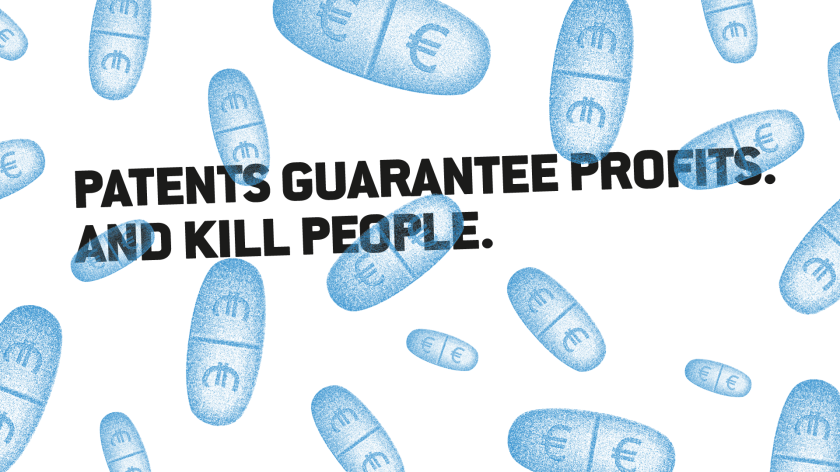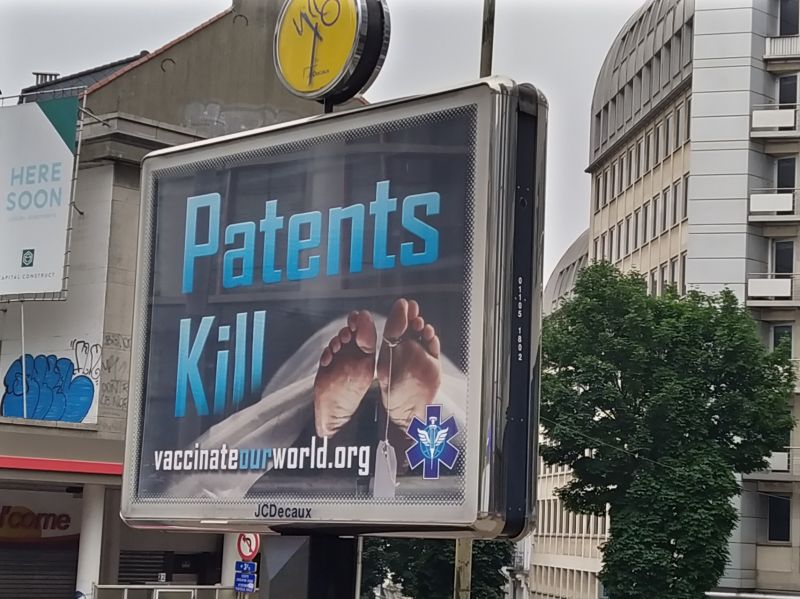A billboard in Brussels, home of the European Union, is perpetuating a dangerous myth that patents are responsible for Covid deaths in poor nations.
The organization that purchased the space falsely believes vaccine IP rights need to be ‘killed’ or so that Covid victims in poor countries may live. These well-intended activists are fail to see the forest for the trees.
Despite efforts to educate governments and businesses about the nature and impact of patents and know-how, including Covid-19 vaccine intellectual property, the false narrative that patents destroy more than has become a dangerous meme.
There are several theories about how and why these lies persist, including:
- Less developed countries (LDCs) and some politicians representing leading economies are under the impression that waiving ownership of vaccine IP rights owned by Big Pharma will provide a recipe for nations to manufacture their own cheap supply
- Technology companies, including those in e-commerce and software, already unfavorably disposed to patents, want to further weaken them
- Intellectual property rights appear to benefit primarily big companies, wealthy nations and lawyers.
Covid vaccines are among the most important and successful inventions know to modern science. They were developed in record time, saving literally millions of lives and trillions of dollars. Government researchers contributed significantly but could not have achieved these goals on their own.
These discoveries took place because of the ability to secure the inventions under patent law, not in spite of it.
U.S. taxpayer dollars in the U.S. were said to fund as much as $18 billion of the research involved and purchased doses for $10 to $19.50. The vaccines are free to people in the U.S. and many other nations, regardless of legal status, because governments had the means to fund a purchase program.
Was it wrong to leave poor nations out of the discussion for early relief? Perhaps, but don’t blame the inventors and manufacturers of the vaccine for that.
With all due respect to NIH, Pasteur, Max Planck and other government research institutions, had the development dollars been provided to them would they have come up with an effective vaccine and manufactured it faster? If history is any indication, probably not.
It is no secret that U.S. and other nations wanted their people to be vaccinated as quickly as possible. Now, that there is sufficient supply, albeit questionable compliance,, they can think more globally. An aggressive plan to help vaccinate the world is essential for many reasons. This is a government and human problem which pharma manufacturers can and should help address. Making them a scapegoat is impractical, unfair and sends a false message.
Less than half of America is fully vaccinated (49.1% as of July 19), which is not due to lack of supply. Tragically, much of the world is largely unvaccinated because of cost and availability.
A covid patent waiver will not achieve essential vaccination goals. In fact, it will likely make broad vaccination goals more difficult to achieve by putting production in the hands of those without the resources or experience to manufacture and deliver vaccines. A patent waiver creates doubt when it comes to investing in the future. When it comes to breakthrough innovations, governments need investors. They cannot go it alone.
No Secret
There is no secret to published patents. They are available for any government, inventor, business or individual to read or use, as they see fit. Practicing them may result in a legal challenge, damages or licensing, but the likelihood of being stopped by an injunction is relatively low. Patents are public documents. Anyone anywhere can easily access them.
Complex expertise or know-how, sometimes called trade secrets — the rocket fuel that often powers patented inventions — is not readily shared. It is essential to manufacture vaccines, as well as provide costly, difficult to construct plants and staff and maintain them. Despite providing significant research dollars, the U.S. under President Trump chose not to require patents be licensed to other nations and only some vaccines provided.
That might be wrong, but rewarding the innovators who identified an extraordinarily effective way to address a monumental global threat in record time by confiscating their rights is legally dubious and morally suspect. It sends a message that not only does breakthrough success not really matter, it is a potential threat to public company survival.
“The US government can use its leverage over these companies to encourage them to participate in tech transfer initiatives and other licensing agreements as may be needed,” reports Health Affairs, a leading journal of health policy thought and research. The peer-reviewed journal was founded in 1981 under the aegis of Project HOPE, a nonprofit international health education organization.
The article does asks for technology transfer and pressure on vaccine makers from funding sources — Wisely, it does not seek a patent waiver.
“Furthermore,” continues the update, “as recommended by the WHO-commissioned Independent Panel for Pandemic Preparedness & Response, the US can request tech transfer and a commitment to voluntary licensing in future deals with vaccine developers receiving public funding. These agreements can also include measures to cap price at a certain level of manufacturing costs in sales to LMICs.”

Frustration abounds when it comes to Covid-19. Vaccinating the world, including those nations that cannot afford to buy doses — even if they are offered at cost by the companies that developed them — is a stark reality that needs to be aggressively addressed through government funding and relief programs. Surely, Pfizer, Moderna, Johnson & Johnson and Astra Zeneca must play a major role. But should they be expected to succeed where governments and agencies have failed?
The best we can tell Vaccinate Our World (VOW) is a European NGO. It lists supporters, many of who are AIDs organizations and less-known NGOs. AIDS Healthcare Foundation (AHF) is its major partner. There is no Guidestar or Google Search information about Vaccinate Our World; no ‘About Us’ or similar background on its website, nor is there a mailing address.
Was it wrong to leave poor nations out of the discussion for earlier relief? Perhaps, but don’t blame the inventors and manufacturers of the vaccine for that.
VOW is not the only NGO to call for a Covid vaccine patent waiver. Doctors Without Borders (Medicins Sans Frontieres) and others have, too.
Delicate Balance
Inventors are an easy target. So are patents, whose recent ‘meme’ is beset by confusion and negative media stereotypes, such as patent ‘trolls.’ Some are orchestrated for gain by businesses that wish to discredit patents, thereby weakening their potential threat and cost to license.
Easily manipulated are those with legitimate concern amidst a world health emergency, but who do not understand that a waiver is more likely to cost lives than save them, and is a dangerous precedent that will add unnecessary challenge to future health crises.
The invention system strikes a delicate balance between providing incentive and sharing. For people dying of Covid-19, AIDS or mired in a health emergency the only goal that matters is saving lives. It is hard to see anything but this. Getting caught up in the anti-patent rhetoric in the hopes of “freeing” rights is a winless act of desperation that threatens to destroy more lives than it saves.
Image source: LinkedIn.com; patents-kill.org

